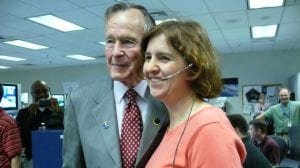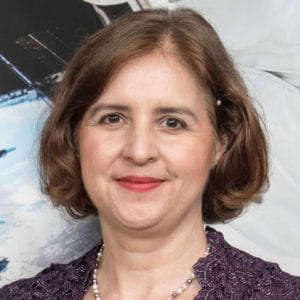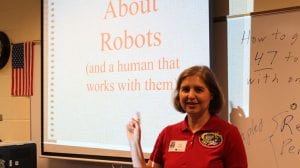
CS alumna Monica Visinsky (BA ’90) with former U.S. President George Bush on location in the Mission Engineering Room at NASA.
Starting in the seventh grade, Monica L. Visinsky, like a million other kids, wanted to be an astronaut.
“My dream was always to work in the space industry. I’m a science-fiction geek, so being able to see the reality of it is always fun,” she said.
While she never made it into space, Visinsky’s work helps support astronauts as a senior engineer with Oceaneering Space Systems (OSS), a NASA subcontractor. On her way there, she earned four degrees from Rice University: a B.A. in computer science and a B.S. in electrical engineering (ECE) in 1990, and an M.S. and Ph.D. in ECE in 1992 and 1994, respectively. Visinsky has worked in robotics for OSS for the past 23 years.
 “Oceaneering makes underwater robotics and vehicles for the oil industry. One of their ROVs (Remotely Operated Vehicles) recovered the Liberty Bell 7 capsule, which sank during the Mercury missions. They supported one of the Titanic explorations, but about 30 years ago they realized an underwater environment is harsh and remote and have a different pressure — very similar to outer space. So they decided to branch out into space robotics,” she said.
“Oceaneering makes underwater robotics and vehicles for the oil industry. One of their ROVs (Remotely Operated Vehicles) recovered the Liberty Bell 7 capsule, which sank during the Mercury missions. They supported one of the Titanic explorations, but about 30 years ago they realized an underwater environment is harsh and remote and have a different pressure — very similar to outer space. So they decided to branch out into space robotics,” she said.
Visinsky’s father retired as a full colonel from the Air Force after 26 years and went to work for Boeing in Denver. As a physicist, he worked on advanced aircraft designs. The family often moved – Houston, Virginia, New Mexico, Belgium, Alabama, Colorado. Her father earned his M.S. in space physics from Rice in 1967. “I was on the Rice campus the day before I was born. It was kind of fated that I would go to school there,” Visinsky said. She credits her father with instilling in her an interest in science fiction and space travel, and a shared love of Star Trek.
“I was young when the Space Shuttle program was coming into its own. Later, I actually applied to be an astronaut a bunch of times. That’s one of the reasons I chose engineering. It’s a good path to follow if you want to become an astronaut.”
Much of Visinsky’s job with OSS consists of supporting robotics on the International Space Station. She reviews designs of new payloads or ORUs (orbital replaceable units) — boxes on the exterior of the space station holding batteries, switches, experiments and other gear.
“We evaluate them for compatibility with the dexterous robot, the maintenance robot for these boxes that also deploys payloads from the cargo vehicles to the Space Station,” said Visinsky, who works at the Johnson Space Center. She is certified as a lead for the Extravehicular Robotics console in the Mission Engineering Room.
 “Remember the scene in the movie Apollo 13 where they dump onto the table all the stuff the astronauts can use to fix the problem? That’s where I work during a mission. I provide engineering support during robotic operations and when cargo vehicles visit the International Space Station,” Visinsky said.
“Remember the scene in the movie Apollo 13 where they dump onto the table all the stuff the astronauts can use to fix the problem? That’s where I work during a mission. I provide engineering support during robotic operations and when cargo vehicles visit the International Space Station,” Visinsky said.
Visinsky almost didn’t get her chance to work in the space industry. When she left graduate school in 1994, there was a hiring freeze in aerospace. The future of space exploration was uncertain, so Visinsky had to look elsewhere and landed a job with Dowell Schlumberger in Tulsa as a software development engineer. “It was a tough decision. I had to move away from NASA,” Visinsky said.
“There’s no NASA facility near Tulsa, I was not in the space industry and I didn’t know anyone there. But I got a lot out of working for Schlumberger. I was there for just a year and a half, and I learned quite a bit about the oil industry and I saw a different culture.”
Looking back on her time at Rice, Visinsky gives much of the credit for her career to Joe Cavallaro, professor of ECE, and Ian Walker, formerly with Rice and now professor of ECE at Clemson University.
“The thing about Rice is the support you get and variety that you have,” she said. “It was more than just an engineering school. I wasn’t stuck with engineers the entire time I was there. My college roommate, who is still my best friend, was a medieval historian. It was that variety and the experiences you can have that make Rice so special.”
–Patrick E Kurp, Engineering Communications.
Monica Visinsky earned Rice University degrees as a double major in 1990: B.A. in computer science and a B.S. in electrical engineering (ECE). She then pursued graduate school in ECE at Rice, completing her M.S. in 1990 and Ph.D. in 1992.